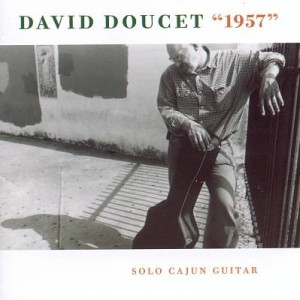 David Doucet’s guitar playing is one of the key elements that have made Beausoleil the most popular Cajun band in the world. Whether on record or in concert, David’s calm demeanor and no-nonsense playing have anchored the band’s performance and provided a contrast to his brother Michael’s ebullience and flamboyance. His flatpicking provides a solid backdrop for Michael’s soaring vocals and acrobatic fiddling.
David Doucet’s guitar playing is one of the key elements that have made Beausoleil the most popular Cajun band in the world. Whether on record or in concert, David’s calm demeanor and no-nonsense playing have anchored the band’s performance and provided a contrast to his brother Michael’s ebullience and flamboyance. His flatpicking provides a solid backdrop for Michael’s soaring vocals and acrobatic fiddling.
When the guitarist does step up for a solo break in a Beausoleil song, you’re almost always left wanting more of his playing, which seems to draw equally on the styles of Doc Watson and Richard Thompson. The solo Cajun guitar album, 1957, is the answer to that longing for more than a series of brief glimpses of David Doucet’s artistry.
Right off the bat, 1957 packs a surprise. Only one of the 15 tracks features Doucet’s familiar flatpicking style. On every other number, he has translated these mostly traditional fiddle and accordion tunes into fingerpicking exercises. Which is not to say that they sound like etudes. These waltzes, ballads and two-steps sound as though they were meant to be played like this all along.
Another surprise is that Doucet sings on all but five of the 15 tracks. His singing style isn’t as accomplished as Michael’s, but he comes across as so warm and friendly, it’s easy to just enjoy the song.
All five of the instrumentals are superb, especially the opening cut, “Lake Arthur Stomp” and “Cajun Waltz,” the latter two being old fiddle tunes. “Cajun Waltz” especially is a good example of Doucet’s strong sense of rhythm and demonstrates his great feel for melody as he lovingly caresses all the nuances of this delightful tune.
He follows “Cajun Waltz” with “Midland Two Step” by Amede Ardoin, the godfather of Cajun accordion players. This is my favorite on the album, with its peppy major-key melody and its amusing lyrics (translated by Doucet in the liner notes) about a young man who leaves his family for the love of a girl who then rejects him.
Right on its heels is another classic Cajun number, “Baiolle,” the only flatpicked song on the album. With its minor key and lilting melody line, this song has a definite Celtic feel to it.
Doucet’s most confident singing and some of his best picking comes on another old-time standard, “My True Love.”
The title track is another eminently hummable tune, this one by the great Alex Broussard. It tells the story of how the people of southern Louisiana helped each other in the wake of Hurricane Audrey, which devastated the area a few weeks before Doucet was born.
This is a sterling collection of songs, made even stronger by the dynamic tension Doucet has wrought between melody and rhythm. He has not only transformed these fiddle and accordion pieces into minor masterpieces of guitar picking, but he has lifted them out of the realm of dance tunes and placed them squarely in the realm of folk art.
(Rounder, 1999)
